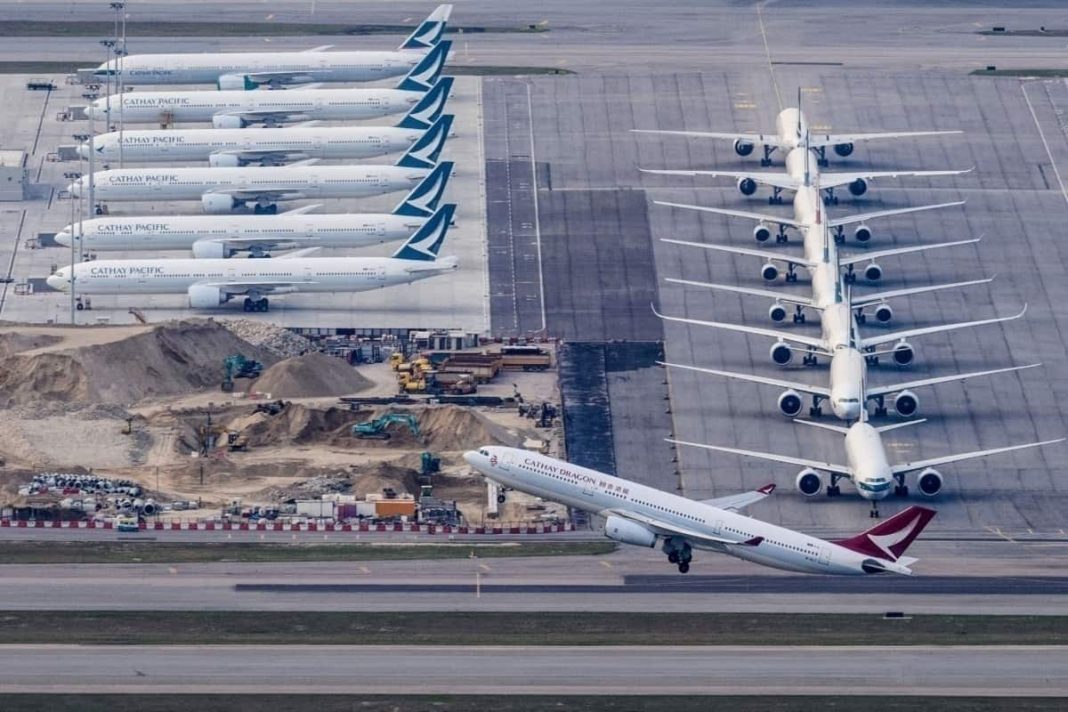Hong Kong International Airport (HKIA) allowed the resumption of transit services in June, after a two-month ban to help stop the spread of the coronavirus. Passengers can now travel with multiple airlines, but there are several new restrictions in place. Let’s take a closer look.

Before departure
While Hong Kong remains shut to non-residents, transit services resumed at HKIA from June 1st. Before travel, passengers are advised to check the entry requirements of their final destination and that they meet the requirements needed to transit through HKIA.
Since June 15th, passengers flying into Hong Kong have been allowed to travel with multiple airlines. In pre-COVID times passengers could fly using separate tickets, but now all legs of the journey must be on the same ticket. Also, passengers must have completed check-in for all flights before they touch down at HKIA. All boarding passes and bag tags must be printed out, and all bags must be checked through to the final destination.
Passengers from certain countries are also required to show proof of a negative COVID-19 test before boarding. This must be conducted by a certified laboratory or healthcare provider up to 72 hours before departure. Passengers from Bangladesh, India, Indonesia, Nepal, Pakistan, Philippines, South Africa, the USA, and Kazakhstan must carry an approved COVID-19 health certificate or risk a $1290 (HK $10,000) fine and six months imprisonment.

Arrival into Hong Kong
On arrival at Hong Kong International Airport, passengers can expect the airport to be much quieter than in pre-COVID times. On arrival, all passengers who have connecting flights must undergo body temperature screening. Passengers will also be given stickers at transfer points so that they can be easily identified.
Once through medical screening, passengers are required to go directly to the boarding gates of their connecting flight. All travelers must wear facemasks while at the airport. Designated dining areas have also been set up for those in transit. Passengers are also asked to maintain a physical distance of 1.5 m from other passengers at all times.
Robots are a new addition to HKIA and have been deployed to ensure that passenger facilities remain clean and are disinfected regularly. Sanitiser is also available at several points throughout the airport.

New rules cause problems
These new rules on transit have caused some issues for passengers, who could previously check-in for their connecting flight on arrival in Hong Kong. One passenger, Joel Nixon, had a ticket to fly to New Zealand from London, via Hong Kong with British Airways and Air New Zealand. Traveller reported that he was prevented from boarding the first flight in London as he could not check-in for his connecting flight. Three passengers in total were unable to check-in for their connecting flights as the two airlines involved did not have a codeshare agreement.
Joel Nixon said, “This was due to a change in policy in Hong Kong that disrupted bookings with specific airlines who do not have integrated booking systems with Air New Zealand. No regular customer should be expected to even understand why such an issue should arise and certainly wouldn’t think to check this all before flying.”
Flights to mainland China are still off-limits for transit passengers, and several other borders are still shut. This has caused problems for some passengers who have become stranded in HKIA. One passenger has been stuck in transit there since March!
Several airlines have stated that it is the passengers’ responsibility to check these restrictions before booking flights.
Have you traveled through Hong Kong International Airport since transit resumed? Let us know in the comments.
[ad_2]
Source link


